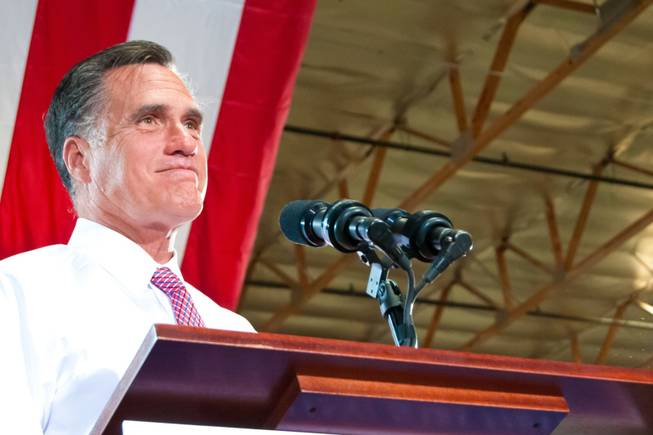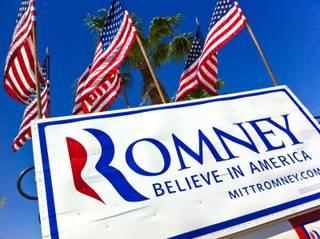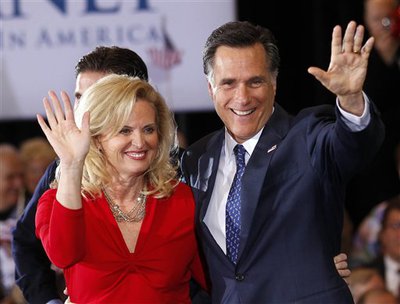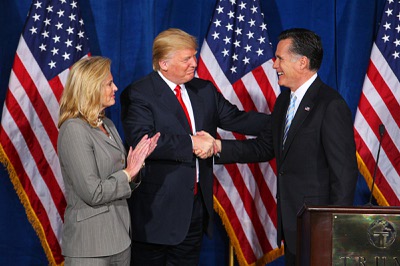
Presidential hopeful Mitt Romney addresses supporters during a campaign rally at a local business, Tuesday May 29, 2012.
Tuesday, June 5, 2012 | 2 a.m.
Sun coverage
- In supporting Mitt Romney, Gov. Sandoval may have to tweak message (06-03-2012)
- Ralston: Time for Romney to fire Trump (05-30-2012)
- At rally, Romney slams Obama’s Las Vegas comments from 3 years ago (05-29-2012)
- Romney clinches GOP nomination with Texas win (05-29-2012)
- Romney event in Las Vegas: $2 million goal, $675,000 pledged (05-28-2012)
- More Sun political news
When George W. Bush ran for president in 2000, there was never any question about who his political maestro was: Karl Rove, the man later dubbed “Bush’s brain.”
Mitt Romney, well into his second, more successful presidential run, still has no Rove-like figure — an all-seeing adviser engineering the entire, increasingly sprawling, political apparatus. But aides and insiders say there is someone very much in charge — and that would be, for better or worse, Mitt Romney.
Romneyworld consists of a set of interlocking circles, created during his time in business and in government, tied together by a campaign manager with a clear mandate over the operation but with the candidate himself at the center. According to the basic presidential political playbook, that’s risky; staffers always say their boss is in charge but also always worry about a candidate who’s too immersed in the nitty-gritty details. Nomination narratives are full of cautionary tales about candidates who couldn’t see the proverbial strategic forest because they obsessed over every decision, creating a leadership vacuum.
But the CEO-structure of Romney’s campaign reflects a central belief set by Campaign Manager Matt Rhoades and adhered to by others that staff should not be the focus of attention — and it reflects the management style that has made Romney successful in the past.
“(Romney) likes a pretty horizontal organization where there’s a number of different inputs into him,” said former Missouri Sen. Jim Talent, a Romney ally and surrogate. “He fields information so quickly and he has such a strong frame of reference that he knows what questions he wants to ask.”
“You have a group of people there that are mature, collaborative, (there’s) very little personality conflict and turf-fighting and the like,” said former Minnesota Gov. Tim Pawlenty, who has become a key Romney surrogate.
He credited Romney, saying the way the campaign functions reflects the personal approach of the former Massachusetts governor.
“I think it’s remarkable because the campaign is really high-functioning, and part of the reason it’s so high-functioning is because Mitt has assembled a group of seasoned (operatives),” he added, saying they have experience “coming to a team conclusion and executing it as a team.”
“Gov. Romney has put together a very strong campaign organization that shows he is ready to take on the Chicago-style politics of the Obama campaign,” said Louisiana Gov. Bobby Jindal.
One advantage Romney has enjoyed is continuity. The core of his 2008 staff remains largely the same. And the various groups now linked together under Romney 2012 Inc. have, at different points in Romney’s life, worked together, eliminating some of the tensions that crop up with new additions when primary candidates become their party’s nominee.
There are, for instance, the Boston power center composed of Beth Myers, Eric Fehrnstrom and Peter Flaherty; the business power center represented by longtime adviser and friend Bob White; a fundraising power center featuring “sixth son” Spencer Zwick; and the personal power center of longtime friends and family of Romney.
Messaging is something of a collaborative effort among a senior group of advisers but is identified heavily with Rhoades and admaker Stuart Stevens, who also does most of the speech writing.
The latest sphere of influence is Ed Gillespie, the former Republican National Committee chairman and George W. Bush insider who joined the campaign at the beginning of April as a top adviser. Gillespie has become much more involved in the operation but has avoided stepping on the toes of other key players. He has worked with Rhoades — unequivocally cited by all involved in the campaign as the person calling the shots — as a co-ringmaster who works to tie the different circles together.
Seen initially as a force who would primarily be a nod to donors and institutional players in Washington with whom Romney has the barest of connections, Gillespie is playing much more of an active role on calls and in meetings (he now has a desk at the campaign’s Commercial Street headquarters in Boston).
Romney’s involvement is particularly strong on the policy side, where he has little desire to step back, according to a number of people. He is a power center of his own who takes input from his wife, Ann, and sons very seriously. His oldest son, Tagg, is in frequent contact with his father, even though he’s not traveling much, sources said.
“That exact analogy is one that people used a lot four years ago, that there wasn’t a Rove-like (figure) that would call all the shots,” said one Romney insider, referring to the candidate’s 2008 campaign. “And there is nobody with that title. You’ve got people like Stuart and Eric to some extent, and Matt, who are all playing parts of that role. And you’ve got Mitt, who is much more tightly involved in strategy and thinking, having been through it, than he might have been four years ago.”
Yet the insider said the current team is taut, with a clear core group that makes decisions along with the man they all call “The Gov.”
“There’s a lot of collaboration, but at end of day, it’s generally Stuart, Matt, Beth and the Gov,” said one source familiar with the setup.
Sen. John McCain had no Rove-like figure either, although it was clear who his three closest aides were — Rick Davis, Mark Salter and Steve Schmidt. However, that was on the second iteration of his shaken-up 2008 campaign.
Several people interviewed said the different clusters of Romney advisers is preferable to having an adviser act as overlord, and they function well together in a model that replicates the one Romney has tended to follow throughout his career, soliciting a range of opinions before ultimately making a decision.
Tom Rath, the former New Hampshire attorney general who advised Romney’s Granite State campaign, said it’s “a really tight, well-functioning group that shares a vision about how this has to work. And there’s a plan and people stick to it. (It’s) the essential core of the campaign.”
Romneyland is in the midst of a rapid build-out that has prompted questions from outsiders about who is running things. Some express concern about the Romney team’s hierarchical structure.
“I really don’t know who’s in charge,” said a prominent Republican who has begun working with the campaign. “Is it Matt? Is it Stu?” Another Republican was under the impression that the person at the helm is really Eric Fehrnstrom, who’s described as best understanding “Mitt’s voice.” Fehnrstrom works closely on messaging with Gail Gitcho, the communications director.
But if the structure and who’s in charge are unclear to outsiders, it’s clear internally with the core group that’s been there throughout the campaign.
Talent, like many interviewed, said the campaign structure is simple: Rhoades is in charge, but everyone has a clear task, and there is little of the fiefdom-building and tension that characterized the McCain campaign.
“They’re staffing up now a lot,” said Talent. “There’s a lot of flux in the organization, and I think it will take a little time to work itself out as new people come in.”
As for Romney, Talent said, “He is very much in control, but he also understands that the role of a candidate is not to run the day-to-day operations of the campaign.”
In a political era in which general consultants tend to be the true power behind the throne and the campaign manager plays an in-name-only role, Rhoades has defied that model.
“I think ... what you see is pretty much what you’re getting. Matt is the campaign manager,” said Talent. “In any Romney organization, you’re going to have people who are good at running things.
“Matt certainly delegates, as far as I can tell.”
There were reports of tension between Rhoades and Stevens at times during the lengthy primary slog, but a number of people attributed it more to different styles than anything else. Rhoades, a former opposition researcher, tends to shun the press and is task-oriented while Stevens is now heavily focused on the creative aspects of messaging and strategy.
There have been moments of drama, but they’ve been rare. Romney is known to have been livid over a New York Times piece, which ran three days before the Florida primary, that elevated the role of staff. The “Etch A Sketch” gaffe by Fehrnstrom and the circumstances surrounding the clearly light vetting of foreign policy spokesman and avid Twitter user Ric Grenell garnered more headlines than any staff issue for Romney’s campaign this cycle.
Also heavily involved are White, Romney’s former Bain Capital hire and close friend who has worked with him in his past races and at the Salt Lake City Olympics. White has Romney’s trust as much as anyone internally, and his influence can’t be overstated, though he is nowhere near as visible as Fehrnstrom, the cable-TV presence, or Stevens, who is also well-known.
There are other tiers of input. There is Ron Kaufman, who became close with Romney as a key Massachusetts GOP political figure and who frequently travels with the candidate. Rich Beeson, the political director, has a clear mandate, as do Deputy Campaign Manager Katie Packer Gage, lawyer Ben Ginsberg (who has served as a liaison with other campaigns) and pollster Neil Newhouse. So does Policy Director Lahnee Chen. Advisers Brian Jones and Kevin Madden playing roles in media and in bridging the campaign to Washington.
And there are still others who, outside the Rhoades-Stevens-Fehrnstrom-Myers-White nexus, have deep ties to Romney.
Zwick, the head of the governor’s fundraising operation, has become as close to Romney as almost anyone in his political operation. Zwick is, like Romney, a member of the Church of Jesus Christ of Latter-day Saints and is known for a no-drama approach to raising money.
There are others who share Romney’s faith or are longtime friends and who play supportive roles in the campaign.
One example is Bill Marriott, who is more at the edge of the campaign but is something of a cheerleader. Another is former Utah Gov. Mike Leavitt, an LDS member who is playing a more active role and has emerged as a central player in planning Romney’s potential presidential transition.
Yet Romney remains at the center of all of these webs. An example of how involved and aware he is on issues of process — and, to some extent, how much umbrage Boston takes at the Obama campaign’s clear disdain for their abilities — was on display Thursday, when Romney talked at length to reporters about why his campaign sent supporters to disrupt a David Axelrod news conference in Massachusetts.
Al Cardenas, head of the American Conservative Union and a Romney supporter since in 2008, said, “He’s as hungry for details as any candidate I’ve ever seen. The enormous respect they have for him is that he works harder than anyone else. And you know, he stays focused. He always wants the latest update.”
Romney not only makes sure he has approved all op-eds that have his name on them, Cardenas said, “he writes most of them.”
He consults on almost everything with his wife, and the family’s sentiments on specific topics remain very important.
“I think there’s a common denominator with Mitt’s campaign since the 2008 primary. It’s a compact, disciplined group that’s very loyal to Mitt Romney. And as far as presidential campaigns go, it’s one of the most resolute campaign groups I’ve ever seen,” Cardenas said.




Join the Discussion:
Check this out for a full explanation of our conversion to the LiveFyre commenting system and instructions on how to sign up for an account.
Full comments policy